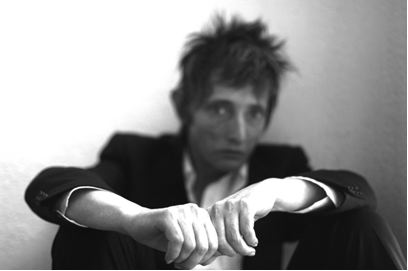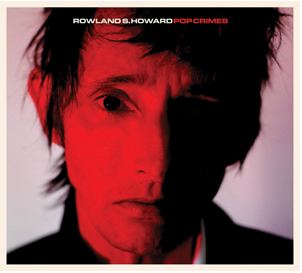Rock & Roll is a mean and dirty business. It burns out the bright young sparks who briefly flicker fiercely near its flame, like tousled-haired youth full of the arrogance of imagination.

Rowland S. Howard, who tragically died on 30 December, 2009 of liver failure, lived a rock & roll life full of flick-knife danger and skinny hipster malevolence.
An intellectual and restless spirit, his recent death on the verge of a long awaited full on comeback is as tragic as some of his darkest lyrics. At least his influence can still be felt in maverick bands like the Horrors, Yeah Yeah Yeahs and several generations of underground musicians who recognize his genius.
Fortunately, before he died he had recorded ‘Pop Crimes’ – his best solo work yet, delivering a darkly mature work full of tense, beautiful music underlining his personal vision of the world.
Long-time faithful friends Mick Harvey (who has played with Rowland for over 30 years), JP Shilo (Hungry Ghosts) and producer Lindsay Gravina make for a formidable backline. Out front, the guitar playing couldn’t be any one else but Rowland S. Howard. His weary, almost journalistic vocal delivery dispassionately sits amidst the sweaty panic of the music, adding to the ill ease.
The ghosts of Lee Hazlewood, Snatch, Sergio Leone, The Shangri-Las and nameless guys from a never-known chain gang fill the album with their shadowy presence, but it’s Rowland S. Howard’s dark and intellectual presence that is everywhere on an album that will be his signature release.
Within the first few breaths, Rowland references Stalin, Calvary and genocide, whilst razoring typically brilliant and idiosyncratic guitar lines that the current crop of post-punk revisionists could only fantasize about.
“Shut Me Down” is Rowland at his most romantic, though inevitably it’s shot through with loss and longing. If only Dusty Springfield were alive to revel in its drama! Talk Talk’s “Life’s What You Make It” is re-imagined as if it had risen from the grind of a Detroit auto plant’s assembly line.
“A Girl Called Johnny” sees Jonnine D from HTRK sidle up to the microphone for a duet that will melt even the coldest of hearts. It’s a glorious missing link between the New York girl group sound and the street smarts of Suicide.
Townes Van Zandt’s “Nothin” is given a chilling tenement building transformation. “Wayward Man” has the band wailing like alarm sirens before Rowland emerges at his most contemplative with the gorgeous, fragile build of “Ave Maria”. Final track “The Golden Age Of Bloodshed” takes the album out on a swaggering, swashbuckling epic, with salvation slipping through the narrator’s fingers.

Rowland S. Howard has history; records like this don’t come from nowhere. He had started playing in teenage bands like The Obsessions and The Young Charlatans in late 70s Melbourne. Whilst still a callow youth, he wrote “Shivers”, an undisputed classic, (quietly ignoring the fact that Rowland perhaps doesn’t see it that way and approaches the song as if it was written by someone else.) The song was recorded by his band The Boys Next Door, who mutated into the wilder and looser Birthday Party.
They relocated to Europe to wage a guerrilla campaign against the trivialities of the 80s, themselves and the world at large in a series of wild and feral records that oozed a high-IQ filthy disgust.
The Birthday Party were one of the most no-holds-barred bands of all time. Their expressive and wild music packed a fierce and filthy intellect as it thrilled the underground music scene of the early 80s.
Front man Nick Cave has become an international star – a dark-hearted preacher who sings songs of tender love or demonic filth with a leering glee. The charismatic star still stalks the stage with a powerful presence, but it is his Birthday Party performances that introduced the world to an astonishingly dangerous persona.
To his side was a stick-thin razor sharp guitarist consumed with the feral power of his instrument- so little utilized by most other players. Rowland S. Howard would shimmy with a devilish glee – at one with his instrument as he carved out great slices of six-string thunder. His guitar could twang deep and dark, like Link Wray gone bad; it could skree free jazz filth or it could cut loose with the power of The Stooges. It was the purest cigarette-in-the-mouth power of rock & roll. An astonishing sound capturing all the potential for freedom that the instrument possesses in a life affirming blues howl.
It was the perfect foil to Cave’s astonishing poetry. And in a world of too many guitar players, Rowland Howard actually managed to produce a distinctive sound all of his own – far too rare an achievement with an instrument that is regularly abused by the average and the cloth-eared who adhere to tired old rules, techniques and clichés.
Players like Rowland S. Howard arrive only occasionally – a handful in each generation – and are barely recognised by the dull mainstream that rewards effort over genius and plodding hard work over brave and instinctive originality.
The last two Birthday Party EPs contained some of his greatest guitar work- deep, sonorous riffs and garbage-can twanging that echoes the band’s kinetic chaos with a delta blues instinct, sieved through a punk rock intensity. Few rock bands have made records as dark and deadly as this. A generation’s post punk disgust at the vile world was spewed and skewed back in loud and loose music that fought with the audience.
Howard’s guitar style and song writing was one of the key components of the Birthday Party, for two albums and a series of singles. Onstage Rowland was the skinny badass guitar freak with the ‘six strings that drew blood’, as Nick Cave once sang. His popeyed expression and disheveled hair made him a charismatic foil for Cave as well as an arresting figure himself.
It was because of this intensity that they collapsed. There was no way the competing talents of Nick Cave and Rowland Howard could be contained in one unit. Howard then left the Birthday Party to become a member of Crime and the City Solution, a band led by Simon Bonney, and later formed These Immortal Souls with Genevieve McGuckin, his brother Harry Howard, and Epic Soundtracks.
He made a singularity brilliant record with Lydia Lunch – a powerful swaggering take on Lee Hazelwood’s “Some Velvet Morning”. His sneering vocal alone on that record makes it one of the great releases of the period, and the cover shot of him and Lydia Lunch drips pure sex. The pair of them further collaborated on other songs that dripped full of erotic violence and melancholy.
Whilst his former associates have moved on to weekend colour supplement acceptability, Rowland moved back to Australia and seemed to drop out of view, with only the occasional snippet of information giving clue to his activities. His ghostly demeanour (pale, gaunt, stick thin, sickly, dark humoured, fatalistic) has perhaps inadvertently added far too much credence to his shadowy presence. The shadow of this myth has seemingly obscured the sheer volume of his creativity and the singularity of his musical vision.
In reality always respected by his peers, a scan through Rowland’s catalogue of work sees him allied with the likes of Lydia Lunch, Thurston Moore, Wim Wenders, Barry Adamson, The Gun Club, Nikki Sudden, the Beasts Of Bourbon, the Hungry Ghosts and HTRK. Rowland’s own ensemble These Immortal Souls gun their engines in the ill-lit background and the legacy of his work with The Birthday Party scores the skin of successive generations of musicians and fans.
But it’s a history Rowland would gleefully have put a match to.
Rowland S. Howard has carved a deep scar across the landscape of contemporary music. Elsewhere in the world, such a rogue character would be rewarded with glowing features in glossy music magazines, invited to curate arts festivals, offered their own radio show or feted with tribute albums. In Australia such a triumph of the spirit, a lifetime spent wilfully unyielding to the middle ground, is not so highly prized and not so publicly commended.
Until recently.
Last year Rowland S Howard performed at All Tomorrow’s Parties, at the Mount Buller ski resort in alpine Australia. Daylight and the charms of the great outdoors perhaps seemed at odds with his legend. But the large crowd was with this enigmatic man, grasped his right to be there and warmly welcomed him. Rowland seemed well aware that it was an unlikely journey for him to make in order to connect with an audience who know and value his worth. And with ever-sharp wit, he greeted them with the wry observation that “Sometimes Muhammad must come to the mountain.”
With the release of Pop Crimes that journey continues.
Pop Crimes will be released by Infectious Records on May 31, 2010.
Buy Music:
Rowland S. Howard on amazon.com
Rowland S. Howard on amazon.co.uk
Rowland S. Howard MySpace